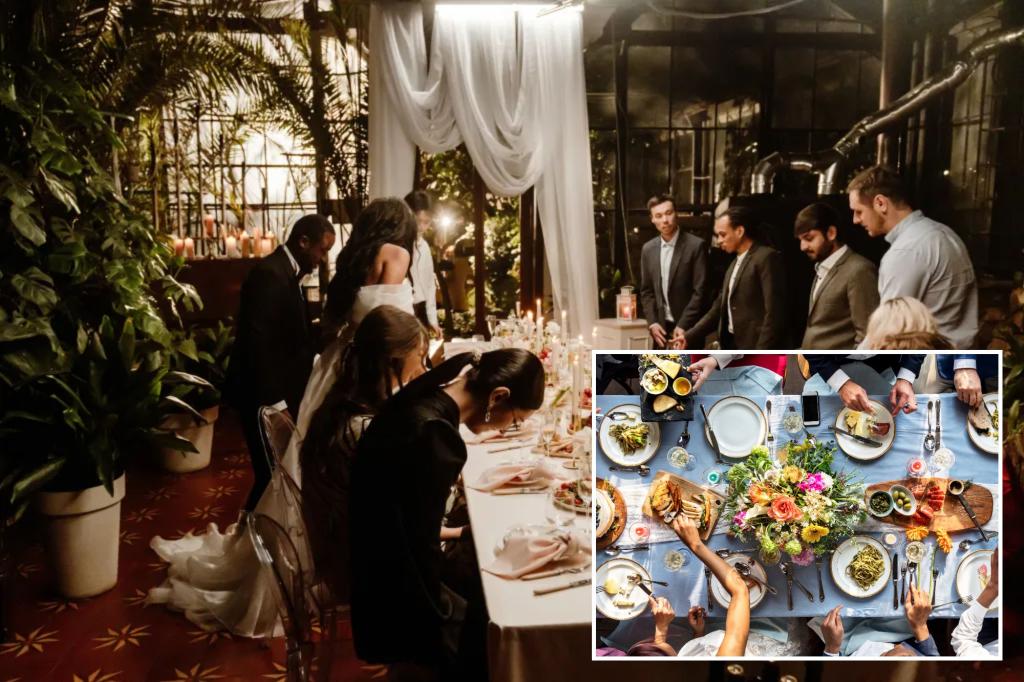Wedding Guest Shamed for Accommodating Her Medical Dietary Restrictions
In a heartfelt account shared on Reddit, a 36-year-old woman found herself at the center of unexpected wedding drama when she attempted to quietly manage her medical dietary restrictions. The guest was initially thrilled to attend her university friend’s wedding celebration, but her excitement was tempered by concerns about her health condition that prevents her from consuming gluten and dairy products. “It’s not a fad diet or preference,” she explained in her post. “I get very sick if I eat them.” Such restrictions are common with conditions like celiac disease, which can cause intestinal damage when exposed to gluten, or lactose intolerance, which makes dairy digestion difficult and uncomfortable. Understanding the importance of clear communication, she had dutifully noted her dietary requirements when sending her RSVP to the couple, hoping accommodations could be made.
Unfortunately, despite her advance notice, the bride informed her that the venue couldn’t guarantee completely gluten or dairy-free food due to potential cross-contamination risks in the kitchen. The bride’s solution was surprisingly casual—suggesting her friend would be “fine just eating salad and fruit” at the reception. Not wanting to create problems or add stress to her friend’s special day, the guest took matters into her own hands with what seemed like a reasonable compromise. She discreetly packed a small container of simple, inoffensive food—grilled chicken and rice—to consume quickly during the event. When dinner service began, she slipped away briefly to eat her prepared meal, then promptly rejoined the celebration. “I didn’t make a fuss, didn’t bring any smelly food, and didn’t take anything away from the event,” she explained, highlighting her efforts to be considerate while managing her health needs.
What should have been a private, practical solution erupted into unexpected drama when the groom’s mother spotted her eating her packed meal. Rather than responding with understanding, the mother-in-law launched into a public shaming campaign, approaching other guests to complain that the woman was “disrespecting the caterer” and “making the couple look cheap” by bringing her own food. The confrontation escalated when the mother-in-law directly approached the guest, declaring she was “embarrassing the family” with her behavior. With remarkable insensitivity, she suggested the guest should have simply eaten before arriving if her dietary needs were so concerning. Perhaps most hurtfully, the mother-in-law criticized the location where the guest had chosen to eat—near a wall on her way to the bathroom—claiming she looked “like a homeless person” for not eating at the table with everyone else.
When the guest attempted to explain that her actions were medically necessary to prevent illness, the mother-in-law dismissed her concerns entirely. With an eye roll that communicated volumes about her lack of empathy, she called the guest “selfish” and delivered a particularly cutting remark: “The wedding is about the couple, not about your dietary needs.” This dismissive attitude toward medical necessities reflected a troubling failure to distinguish between personal preferences and health requirements. More surprisingly, some mutual friends sided with the mother-in-law, suggesting the guest had made an “a-hole move” that somehow reflected poorly on the newlyweds. This unexpected lack of support from friends who presumably knew about her condition added another layer of hurt to an already uncomfortable situation.
The online community, however, rallied behind the wedding guest with overwhelming support. Commenters validated her practical approach to a difficult situation, with one succinctly noting, “You took care of your own needs.” Others pointed out the absurdity of the mother-in-law’s position, with one asking rhetorically, “Is it somehow respectful to eat foods that would physically harm you? LOL. No.” Many respondents identified the mother-in-law as the true source of disruption, with one commenter suggesting she was “looking to stir trouble where there isn’t any.” The situation raised red flags for others about potential future family dynamics, with one person warning, “If I were the bride, I’d be watching MIL closely. Since the poster is a friend of the bride, this could be a sign of trouble down the line.”
Interestingly, while most of the criticism focused on the groom’s mother, some commenters also questioned the bride’s handling of her friend’s dietary restrictions. One observer noted, “The bride didn’t seem too worried her friend would have enough to eat. She gets some side-eye from me for that.” This highlights how the intersection of medical needs, social expectations, and wedding traditions can create complex situations that test relationships. The incident serves as a reminder of the challenges faced by those with medical dietary restrictions in social settings, where their health needs are sometimes misinterpreted as preferences or inconveniences rather than necessities. It also underscores the importance of empathy and accommodation in celebratory spaces, where everyone deserves to participate fully without compromising their wellbeing. For this wedding guest, what should have been a joyful occasion celebrating her friend’s marriage became an unexpected battleground over the legitimacy of her health needs—a situation that no one with medical dietary restrictions should have to face.














